Iteach them to do things by themselves
- 格式:doc
- 大小:27.00 KB
- 文档页数:2
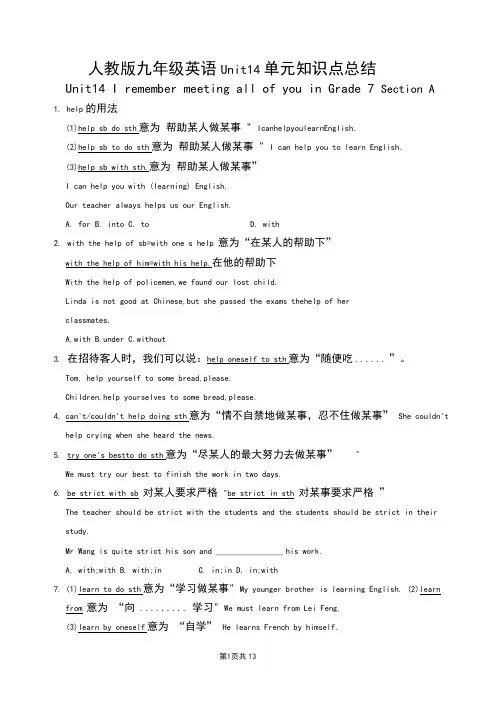
人教版九年级英语Unit14单元知识点总结Unit14 I remember meeting all of you in Grade 7 Section A 1.help的用法(1)help sb do sth意为帮助某人做某事 " IcanhelpyoulearnEnglish.(2)help sb to do sth意为帮助某人做某事 " I can help you to learn English.(3)help sb with sth.意为帮助某人做某事”I can help you with (learning) English.Our teacher always helps us our English.A. forB. intoC. toD. with2.with the help of sb=with one s help 意为“在某人的帮助下”with the help of him=with his help.在他的帮助下With the help of policemen,we found our lost child.Linda is not good at Chinese,but she passed the exams thehelp of herclassmates.A.withB.underC.without3.在招待客人时,我们可以说:help oneself to sth意为“随便吃...... ”。
Tom, help yourself to some bread,please.Children,help yourselves to some bread,please.4.can't/couldn't help doing sth意为“情不自禁地做某事,忍不住做某事” She couldn'thelp crying when she heard the news.5.try one's bestto do sth意为“尽某人的最大努力去做某事”^We must try our best to finish the work in two days.6.be strict with sb 对某人要求严格"be strict in sth 对某事要求严格”The teacher should be strict with the students and the students should be strict in their study.Mr Wang is quite strict his son and ________________ his work.A. with;withB. with;inC. in;inD. in;with7.(1)learn to do sth意为“学习做某事" My younger brother is learning English. (2)learnfrom 意为“向 ......... 学习" We must learn from Lei Feng.(3)learn by oneself意为“自学” He learns French by himself.(4)learn about意为“了解,知道”The more you learn about the Chinese history,the more you enjoy living in China.8.乐器前必须加定冠词the,球类运动前不加任何冠词。

〔〕9.Whatdoyouthinkoftheshortboy?2021年新人教版英语中考模拟试题 A.Hewasahard-workingstudentB.HewasanunhappyboyC.Hehatedhavinglessons听下面一段对话,答复第10至第12三个小题。
〔〕10.What’swrongwithJessie?A.ShehasaheadacheB.ShehasastomachacheC.Shehasa班级:_____________XX:_____________toothache听力局部〔20分〕〔〕11.HowisJessiefeelingnow?A.WorriedB.TerribleC.Better一、听力理解(20小题,每题1分,共20分)第一节听选答语:根据你听到的句子选择正确的答语,并将其标号填入题前的括号内,每个句子读两遍。
〔〕1.what’stherelationshipbetweenthetwospeak2e1rs·世?纪*教育网A.FatherandsonB.MotheranddaughterC.fatheranddaughter〔〕2.HowwasMissZhao’strip?A.TerribleB.PleasantC.Exciting〔〕3.Howmuchdoesanewcomputercost?A.1000dollarsB.2000dollarsC.3000dollars〔〕4.WhydoesHelenlookworried?A.BecausehergoodfriendwasillinhospitalB.Becausethemathtestiscomingnextweek21教育名师原创作品C.Becauseshefailedthemathtestagain〔〕5.Whenwillthemanlearntodriveacar?A.ThisweekendB.NextweekendC.Nextmonth第二节听下面几段对话或独白。
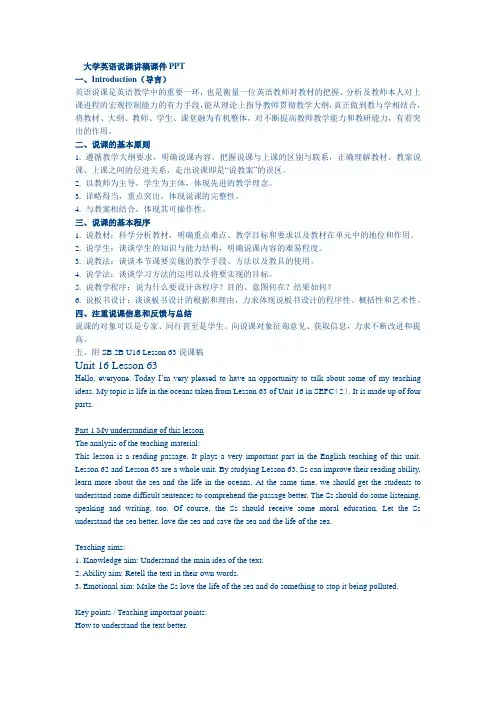
大学英语说课讲稿课件PPT一、Introduction(导言)英语说课是英语教学中的重要一环,也是衡量一位英语教师对教材的把握、分析及教师本人对上课进程的宏观控制能力的有力手段,能从理论上指导教师贯彻教学大纲,真正做到教与学相结合,将教材、大纲、教师、学生、课堂融为有机整体,对不断提高教师教学能力和教研能力,有着突出的作用。
二、说课的基本原则1. 遵循教学大纲要求,明确说课内容。
把握说课与上课的区别与联系,正确理解教材、教案说课、上课之间的层进关系,走出说课即是“说教案”的误区。
2. 以教师为主导,学生为主体,体现先进的教学理念。
3. 详略得当,重点突出,体现说课的完整性。
4. 与教案相结合,体现其可操作性。
三、说课的基本程序1. 说教材:科学分析教材,明确重点难点、教学目标和要求以及教材在单元中的地位和作用。
2. 说学生:谈谈学生的知识与能力结构,明确说课内容的难易程度。
3. 说教法:谈谈本节课要实施的教学手段、方法以及教具的使用。
4. 说学法:谈谈学习方法的运用以及将要实现的目标。
5. 说教学程序:说为什么要设计该程序?目的、意图何在?结果如何?6. 说板书设计:谈谈板书设计的根据和理由,力求体现说板书设计的程序性、概括性和艺术性。
四、注重说课信息和反馈与总结说课的对象可以是专家、同行甚至是学生。
向说课对象征询意见、获取信息,力求不断改进和提高。
五、附SB 2B U16 Lesson 63说课稿Unit 16 Lesson 63Hello, everyone. Today I’m very pleased to hav e an opportunity to talk about some of my teaching ideas. My topic is life in the oceans taken from Lesson 63 of Unit 16 in SEFC(2). It is made up of four parts.Part 1 My understanding of this lessonThe analysis of the teaching material:This lesson is a reading passage. It plays a very important part in the English teaching of this unit. Lesson 62 and Lesson 63 are a whole unit. By studying Lesson 63, Ss can improve their reading ability, learn more about the sea and the life in the oceans. At the same time, we should get the students to understand some difficult sentences to comprehend the passage better. The Ss should do some listening, speaking and writing, too. Of course, the Ss should receive some moral education. Let the Ss understand the sea better, love the sea and save the sea and the life of the sea.Teaching aims:1. Knowledge aim: Understand the main idea of the text.2. Ability aim: Retell the text in their own words.3. Emotional aim: Make the Ss love the life of the sea and do something to stop it being polluted.Key points / Teaching important points:How to understand the text better.Teaching difficult points:1. Use your own words to retell the text.2. Discuss the pollution of the sea and how to save the sea.Something about the Ss:1. The Ss have known something about the sea and sea life through the Internet and other ways.2. They are lack of vocabulary.3. They don’t often use English to express themselves and communicate with others.4. Some Ss are not active in the class because they are afraid of making mistakes.Part 2 My teaching theories, methods and aidsBefore dealing with this lesson, I’ll do my best to carry out the following theories: Make the Ss the real masters in class while the teacher himself acts as director;Combine the language structures with the language functions; Let the students receive some moral education while they are learning the English language.Teaching method:Double activities teaching methodQuestion-and-answer activity teaching methodWatch-and-listen activityFree discussion methodPair work or individual work methodTeaching aids:1. a projector2. a tape recorder3. multimedia4. the blackboardPart 3. Teaching steps / proceduresI have designed the following steps to train their ability of listening, speaking, reading and writing, especially reading ability.The entire steps are:Greetings, Revision, Lead-in and preparation for reading, Fast reading(scanning), Listening, Intensive reading, Preparation for details of the text, Consolidation, Discussion, HomeworkStep 1 GreetingsGreet the whole class as usual.Step 2. Revision1. Ask students some questions to revise the last lesson(show them on the screen).a. How much salt do the oceans contain per thousand parts of water?(35 parts of salt. 3.5% by weight)b. What is coral? Why are corals not found in deep water?c. Why is the Dead Sea called the Dead Sea?2. Check the homework(made a survey about the sea or sea life by surfing the Internet or asking for help from other people). Through this part we can consolidate what they studied yesterday, communicate with others about their survery results and prepare for the new lesson.Step 3. Lead-in and preparation for readingShow them some pictures and let them talk each other, and then use the pictures about sea and life in the oceans to learn new words, for example, Antarctica, huge whale, sperm whale, squid and so on. Purpose: Arouse the students’ intere st of study.Bring in new subject: Life in the oceans.Step 4. Fast readingRead the passage as quickly as they can. I show the questions on the screen and let them get the main idea of each paragraph:1. Why can living things live in such oceans around the Antarctica?2. What does the whale feed on?3. What is the difference between the sperm whale and other whales?Method: Read the text individually, use question—and—answer activity.Purpose: Improve the students’ reading ability.Understand the general idea of each paragraph.Step 5. Listening(book closed)1. Listen to the tape then do an exercise(wb page 90, part 1)2. True or false exercise.(on the screen)Train the Ss’ listening ability and prepare for later exercises.Step 6. Intensive readingRead the passage carefully again and answer some detailed questions on the screen.1. How much does a whale eat at a time?2. Do all the whales feed on small fish?3. How deep can a sperm whale dive?It is also called depth reading or study reading. It means reading for detailed information.Purpose: Further understand the text (Train further reading ability)to find out some different sentences and details of the text.Step 7. Preparation for details of the text on the screen1. ...its heart slows to half its normal speed.slow-v. to become / make slower.2. ing sound wavePresent participle used as adverbial.3. provide sth. for sb.provide sb. with sth.4. at a time: each time5. grow to a length of...Purpose: Train the Ss’ ability of understanding and using laguage.Step 8. Consolidation1. Find out the topic sentences.2. Retell the passage according to the topic sentences.Purpose: I want to know if my students understand the whole text really and if they master what I mean to tell them in this class. What’s more, I want to let them have the ability of introducing and analyzing expression. At the same time, I will write down the topic sentences on the blackboard according to what the students find, so they can retell it easily.Step 9. DiscussionShow them some pictures about the polluted sea and many living things which are in danger and ask them: What are their opinions about it? In order to let them have free choice, I give them another topic: The sea is being polluted. What should they do?Purpose: I mean to give them emotional education. I give them multi-media pictures to arouse their interest of study and their love for life. I mean to make them realize: The sea is in danger!I teach them to do their best to help it and do something from now on. Everyone should do something to love and protect our home.Step 10. HomeworkWrite an article Saving the sea. I want to improve the ability of their writing. At the same time, train the ability of do-it-yourself and looking up the information by themseleves.Part 4. Blackboard designUnit 16 Lesson 63Topic Sentences:1. Some living things can live in Antarctica.(what)2. The whale feeds on small fish.(what)3. The sperm whale feeds on squid.(difference)Discussion:1. The whales are in danger. What’s your opinion about it?2. The sea is being polluted. What should we do?In my opinion, the blackboard design can reflect the teacher’s ability of mastering the text and leading the students to master the text easily.In this text, the design is not easy to write. I write the topic sentences on the blackboard in order to tell the students that this is of the importance in this class. The discussion is of the difficulty.I want to make the design inductive, instructive and artistic.。
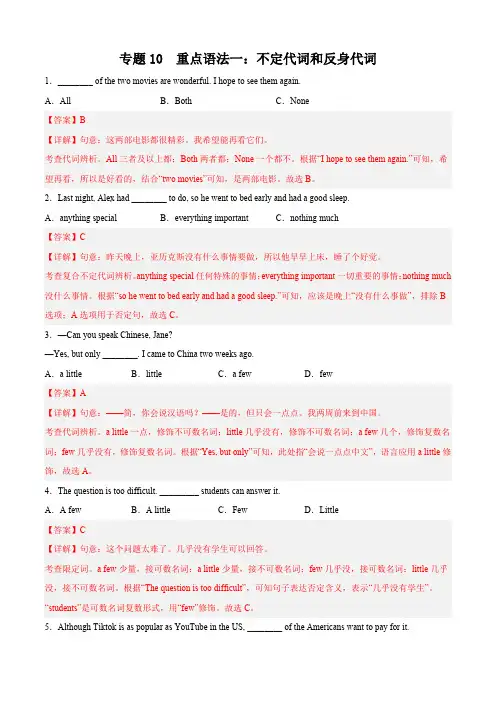
专题10 重点语法一:不定代词和反身代词1.________ of the two movies are wonderful. I hope to see them again.A.All B.Both C.None【答案】B【详解】句意:这两部电影都很精彩。
我希望能再看它们。
考查代词辨析。
All三者及以上都;Both两者都;None一个都不。
根据“I hope to see them again.”可知,希望再看,所以是好看的,结合“two movies”可知,是两部电影。
故选B。
2.Last night, Alex had ________ to do, so he went to bed early and had a good sleep.A.anything special B.everything important C.nothing much【答案】C【详解】句意:昨天晚上,亚历克斯没有什么事情要做,所以他早早上床,睡了个好觉。
考查复合不定代词辨析。
anything special任何特殊的事情;everything important一切重要的事情;nothing much 没什么事情。
根据“so he went to bed early and had a good sleep.”可知,应该是晚上“没有什么事做”,排除B 选项;A选项用于否定句,故选C。
3.—Can you speak Chinese, Jane?—Yes, but only ________. I came to China two weeks ago.A.a little B.little C.a few D.few【答案】A【详解】句意:——简,你会说汉语吗?——是的,但只会一点点。
我两周前来到中国。
考查代词辨析。
a little一点,修饰不可数名词;little几乎没有,修饰不可数名词;a few几个,修饰复数名词;few几乎没有,修饰复数名词。

七年级英语听力教案英文版5篇七年级英语听力教案英文版5篇教师要在自己钻研教材的基础上,广泛地涉猎多种教学参考资料,向有经验的老师请教,而不要照搬照抄,要汲取精华,去其糟粕,对别人的经验要经过一番思考、消化、吸收,独立思考,然后结合个人的教学体会,巧妙构思,精心安排,从而写出自己的教案。
以下是带来的七年级英语听力教案英文版内容,感谢您的阅读,希望能帮助到您!七年级英语听力教案英文版1unit 5 text awhat are friends for? teaching objectives:by the end of the unit, students will be better able to1.understand the varied parts friendship plays in ones life and be betterfriends themselves;e about 30 new words and 10 new phrases and expreions in briefconversations, translation and preliminary writing tasks;e the subjunctive mood with implied condition in real lifecommunication;4.read material of a similar topic and degree of difficulty;5.know how towrite concisely by avoidingoverstated, pompous words and redundant phrases.teaching methods:audio lingual method; presentation; discuion; question-answer.important/difficult points:new words and expreions: chat, turtle, modelpick up, happen to, cd player, out of touch, put in perspective, betrayedconfidence on the planet, get rid of, in good/bad shapesome sentences in the text are difficult to understand, such as i wasthinking about how everybody can’t be every thing to each other, but some peoplecan be something to each other, but some people can be something to each other;wherever, whenever, there’s that spark of recognition; they have beautiful homesfilled with special handmade things presented to them by villagers in the remoteareas they have visited in their extensive travels. teaching procedure:step 1.warming up (30 mints)1) work in pairs or groups, and discu the following questions.? 1.do you have different kinds of friends? how do youclaify them?? 2.what is so great about friends?? 3.under what circumstances can one lose a friend?? 4.is it poible to love and hate a friend at the same time? giveexamples.2) ask students to skim the text for the 8 kinds of friends mentioned inthe text.buddies/ relative friends/ work friends/ former friends/ friends you loveto hate/ hero friends/ new friends 3) introducing the main idea of thearticleit is said that friends are the best gift god has given us.now that we haveeight kinds of friends from the text, what kind of happine or benefit can eachof them bring us? that’s exactly what the text is about.step 2.new words and the notes (20 mints) learn new words and expreions oftext aexplain some important and difficult words and expreions. cement n.水泥,粘合剂v巩固,粘牢nostalgic a.—nostalgia n.—nostalgically ad. subdivision n.—subdividev.—divide v. inopportune a.—(opposite) opportune a. invisible a.—(opposite)visible a. look at the notes on page 1161.marion wink: poet, eayist, and regular commentator on national publicradio’s.the author made up the capitalized expreions in th e text such as“faraway friend,” “relative friend,” which would make no sense at all out ofcontext, with the latter in particular.2.you quit doing drugs, you’re not such good friends with your dealeranymore: this is not meant to be taken seriously.poeion or sale of illegal drugscan result in long prison terms.step 3.key points (60 minutes)? 1.cry on sb.’s shoulder: get sympathy from someone when you tell themyour problems 向某人诉苦以寻求安慰(或同情)e.g.at least she hadn’t cried on his shoulder again.if you ever need ashoulder to cry on, just call me.? 2.in return (for sth.): as payment or reward for something作为报答或回报e.g.he is always helping people without expecting anything in return.we offer an excellent all-round(全面的,多方面的) education to our students.inreturn, we expect students to work hard. ? 3.they hold out through innumerablecrisesbefore...: they are alwaysreliable(可靠的,可信信赖的) and nice when you are in difficult times even thoughthey don’t like what you are doing... ? 4.while so many family relationships aretinged with guilt andobligation:while so many people may feel something of a sense of guilt orresponsibility in dealing with family relationships...? pany goip, once an infallible(绝对可靠的) source ofentertainment, soon awkwardly accentuates the distance between you: officechat used to be an effective way of amusement for you; however, it makes youfeel uneasy since you do not work together anymore and therefore increases thefeeling of distance between you.? 6.work friends share certain memories which acquire a nostalgic glowafter about a decade:memories of your work friends makes you happy after ten years, so yousomehow wish that you could return to those days.? 7.dead end: a street with no way out at one end or a situation from whichnomore progre in poiblee.g.he realized that the job at which he had been aiming all theseyearsseemed to him to be a dead end. he thinks they have reached anevolutionary(逐渐发展的,演变的) dead end.? 8.when you feel you’ve hit a dead end, come to a confusing fork intheroad, or gotten lost in some cracker-box subdivision of your life:whenever you feel helple, confused or at a lo(困惑的,不知所措的) in the complicatedjourney of your life...notice that “cracker-box division” is not a general expreion, but is rathermade up by the author.cracker: 薄脆饼干;咸饼干sth.: formal owning or having obtainedsomething from somewhere 占有(或拥有)某物e.g.she was found in poeion of stolen goods.how did the painting come into your poeion (=how did you get it) ? ? 10.todeath: informal used to emphasize that a feeling or emotion is very strong? be bored / scared / frightened etc.to deathshe was scared to death of what might happen next.i’m absolutely sick to death of it (=very angry, bored, or unhappy aboutsomething) .? bore / scare / love etc.somebody to deathhe drove at a speed which frightened leonora to death.she used to worry meto death.? 11.make me/you sick: spoken a) make you feel very angrye.g.people like you make me sick!b) indicate a feeling of jealousy — used humorouslye.g.you make me sick with your “expenses paid” holidays!? 12.wherever, whenever, there’s that spark of recognition(认识):when you me et a “new friend” for the first time you instantly feel aconnection with each other. step 4.aignment (5 minutes)1.read the article repeatedly and try to remember the new words andexpreions in text a2.finish the study and practice on page 118-130.the teaching plan of unit 5 what are friends for?(college english 2)english department sun xiaofang【篇3:全英文英语阅读课教案模板】阅读课教案school__ number3 middle school____junior or senior section _junior__ cla____3____ grade _1_______size ______45__ time_40_______date __2009-12-28____ materials __go forit______type of leon _reading ____ contents: 1.vocabulary: some nouns aboutfurniture and some daily use things: table, bed, dreer, bookcase, sofa, chair,backpack, books, keys, baseball, drawer, plant. some prepositions of place: on,in, under2.structure: where is (where’s)…?it is (it’s) in/on/under…where are…?they are (they’re) in/on/under… where’s/where’re…?i don’t know.is it /are they on/in/under… ?no, it isn’t./they aren’t./ yes, it is./they are.3.1) dialogue: where’s thebag?i don’t know.is it on the dreer?no, it isn’t.where are my books?i don’t know.are they on the bed?no, they’re not.2)writing: ask, gue and write objectives:1.instructional objectives (language knowledge and language skills)1) to promote students’vocabulary development (table, bed, dreer,bookcase, sofa, chair, backpack, books, keys, baseball, drawer,plant.…)2) to promote students’reading skills a) prediction b) skimming3) to promote students’oral english4) to develop students’writing skill cational objectives (affect,learning strategy and cultural awarene)1) to develop students’ability to communicate with others to getinformation2) to build students’confidence3) to make students learn to cooperate with others 3.personalobjectives:1) to develop teacher’s ability of claroom management focal points: a: thenouns. b: prepositions of place c: where- question andd: answers to “is the… in/on/under the …?”;difficult points: a: use the prepositions to describe position ofthingsb: use the where-question and is it-/are they -question to ask things’positionaids: ppt, blackboard, chalk … procedures and time allotment1.getting students ready for learning( mins) 1) greetings: good morningeveryone! 2) routine task: duty report2.revision: use some pictures to review the vocabulary ( table, bed, dreer,bookcase, sofa, chair, backpack, books, keys, baseball, drawer, plant, on, in,under) and sentence structure:where is (where’s)…?it is (it’s) in/on/underwhere are…?they are (they’re) in/on/under… 3.pre-reading :step1: vocabulary and some phrases learningtask: look at the conversation between them and gue the meaning of thesentences in red.( using the conversation between liu qian and a xin to showthose phrases to the students in order to learn them by the context; becausethesentence structure in the conversation is those they have learnt)(… mins)此步骤包括词汇、语法教学等 4.while-reading 5.post-reading(… mins)1) oral work 2) written work 6.aigning homework1) conclusion: a: vocabularyb: sentence patterns: where is (where’s)…?it is (it’s) in/on/under…wher e are…?they are (they’re) in/on/under…where’s/where’re…?i don’t know.is it /are they on/in/under… ?no, it isn’t./they aren’t./ yes, it is./they are. 2) homework: ask, gue andwritelet your partner to ask as well as gue where your things are in yourroom.write down your conversation by using the following sentence patterns:a: where’s/where’re your…? b: you can gue.a: i don’t know.is it /are they on/in/under… ?b: no, it isn’t./they aren’t.yes, it is./they are.…self-evaluation七年级英语听力教案英文版2Unit 16 Leon 63Hello, everyone.Today I’m very pleased to have an opportunity to talk aboutsome of my teaching ideas.My topic is life in the oceans taken from Leon 63 ofUnit 16 in SEFC(2).It is made up of four parts.Part 1 My understanding of this leonThe analysis of the teaching material:This leon is a reading paage.It plays a very important part in the Englishteaching of this unit.Leon 62 and Leon 63 are a whole unit.By studying Leon 63,Ss can improve their reading ability, learn more about the sea and the life inthe oceans.At the same time, we should get the students to understand somedifficult sentences to comprehend the paage better.The Ss should do somelistening, speaking and writing, too.Of course, the Ss should receive some moraleducation.Let the Ss understand the sea better, love the sea and save the seaand the life of the sea.Teaching aims:1.Knowledge aim:Understand the main idea of the text.2.Ability aim:Retell the text in their own words.3.Emotional aim:Make the Ss love the life of the sea and do something tostop it being polluted.Key points / Teaching important points:How to understand the text better.Teaching difficult points:e your own words to retell the text.2.Discu the pollution of the sea and how to save the sea.Something about the Ss:1.The Ss have known something about the sea and sea life through theInternet and other ways.2.They are lack of vocabulary.3.They don’t often use English to expre themselves and communicate withothers.4.Some Ss are not active in the cla because they are afraid of makingmistakes.Part 2 My teaching theories, methods and aidsBefore dealing with this leon, I’ll do my best to carry out the followingtheories:Make the Ss the real masters incla while the teacher himself acts asdirector; Combine the language structures with the language functions; Let thestudents receive some moral education while they are learning the Englishlanguage.Teaching method:Double activities teaching methodQuestion-and-answer activity teaching methodWatch-and-listen activityFree discuion methodPair work or individual work methodTeaching aids:1.a projector2.a tape recorder3.multimedia4.the blackboardPart 3.Teaching steps / proceduresI have designed the following steps to train their ability of listening,speaking, reading and writing, especially reading ability.The entire steps are:Greetings, Revision, Lead-in and preparation for reading, Fastreading(scanning), Listening, Intensive reading,Preparation for details of thetext, Consolidation, Discuion, HomeworkStep 1 GreetingsGreet the whole cla as usual.Step 2.Revision1.Ask students some questions to revise the last leon(show them on thescreen).a.How much salt do the oceans contain per thousand parts of water?(35 partsof salt.3.5% by weight)b.What is coral? Why are corals not found in deep water?c.Why is the Dead Sea called the Dead Sea?2.Check the homework(made a survey about the sea or sea life by surfing theInternet or asking for help from other people).Through this part we canconsolidate what they studied yesterday, communicate with others about theirsurvery results and prepare for the new leon.Step 3.Lead-in and preparation for readingShow them some pictures and let them talk each other, and then use thepictures about sea and life in the oceans to learn new words, for example,Antarctica, huge whale, sperm whale, squid and so on.Purpose:Arouse the students’interest of study.Bring in new subject:Life in the oceans.Step 4.Fast readingRead the paage as quickly as they can.I show the questions on the screenand let them get the main idea of each paragraph:1.Why can living things live in such oceans around the Antarctica?2.What does the whale feed on?3.What is the difference between the sperm whale and other whales?Method:Read the text individually, use question—and—answer activity.Purpose:Improve the students’reading ability.Understand the general idea of each paragraph.Step 5.Listening(book closed)1.Listen to the tape then do an exercise(wb page 90, part 1)2.True or false exercise.(on the screen)Train the Ss’listening ability and prepare for later exercises.Step 6.Intensive readingRead the paage carefully again and answer some detailed questions on thescreen.1.How much does a whale eat at a time?2.Do all the whales feed on small fish?3.How deep can a sperm whale dive?It is also called depth reading or study reading.It means reading fordetailed information.Purpose:Further understand the text (Train further reading ability) tofind out some different sentences and details of the text.Step 7.Preparation for details of the text on the screen1....its heart slows to half its normal speed.slow-v.to become / make slower.ing sound wavePresent participle used as adverbial.3.provide sth.for sb.provide sb.with sth.4.at a time:each time5.grow to a length of...Purpose:Train the Ss’ability of understanding and using laguage.Step 8.Consolidation1.Find out the topic sentences.2.Retell the paage according to the topic sentences.Purpose:I want to know if my students understand the whole text really andif they master what I mean to tell them in this cla.What’s more, I want to letthem have the ability of introducing and analyzing expreion.At the same time, Iwill write down the topic sentences on the blackboard according to what thestudents find, so they can retell it easily.Step 9.DiscuionShow them some pictures about the polluted sea and many living things whichare in danger and ask them:What are their opinions about it? In order to letthem have free choice, I give them another topic:The sea is being polluted.Whatshould they do?Purpose:I mean to give them emotional education.I give them multi-mediapictures to arouse their interest of study and their love for life.I mean tomake them realize:The sea is in danger!I teach them to do their best to help it and do something from nowon.Everyone should do something to love and protect our home.Step 10.HomeworkWrite an article Saving the sea.I want to improve the ability of theirwriting.At the same time, train the ability of do-it-yourself and looking up theinformation by themseleves.Part 4.Blackboard designUnit 16 Leon 63Topic Sentences:1.Some living things can live in Antarctica.(what)2.The whale feeds on small fish.(what)3.The sperm whale feeds on squid.(difference)Discuion:1.The whales are in danger.What’s your opinion about it?2.The sea is being polluted.What should we do?In my opinion, the blackboard design can reflect the teacher’s ability ofmastering the text and leading the students to master the text easily.In this text, the design is not easy to write.I write the topic sentenceson the blackboard in order to tell the students that this is of the importancein this cla.The discuion is of the difficulty.I want to make the design inductive, instructive and artistic.七年级英语听力教案英文版3一、导入Presentation: 听一听:找出下列单词的发音A:cat bag rat sad apple B: set bed get wet red C: sit bigpig zip his 让学生找出每组单词中的相同发音,并将音标写在白板上进行一对一教学/æ/ /e/ /i/ Groupwork:让学生分组进行填空比赛cat /k___t/ bag /b___g/ map /m___p/ jam/dʒ___m/ fat /f___t/ yes/j___s/ red /r___d/ wet /w___t/ jet /dʒ___t/ pen /p___n/ sit /s___t/ big /b___g/zip /z___p/ fit /f___t/ him /h___m/二、交际用语/ 常用对话——问候、告别Lead in 老师设置场景进行场景交际用语的教授A: Hi!/ Hello!A: Good morning / afternoon / evening /night.A: How are you? / How are youdoing?A: Good-bye / Bye / Bye-bye.A: See you later / tomorrow / soon… A: Nice /Glad to meet you.A: Are you OK / all right? A: How is everything with you?How is it going?Group work: role-play三练习Practice 1.音标辨音B: Hi!/ Hello!B: Good morning / afternoon / evening /night.B: I’m fine / OK.Fine / Very well, thank you.Just so so.Not very good./ …B: Good-bye / Bye / Bye-bye.B: See you.B: Nice / Glad to meet you, too.B: Yes, I’m OK./ All right.B: Just soso.Very good./ Everything is going well.Listen to the teacher ,listen to thewords in the sentences and tell the teacher the sound of the word.e.g.”yesterday I was very sad” “it is a big dog” “I like color red”2.根据对话选出正确的答案:Set 1 () 1. Who is that girl? A.Lily B.Jeica C.Kate () 2. Where are they now? A.At home.B.In a shop.C.At school.() 3. Is the boy, Michael, a new student? A.Yes, he is.B.No, he isn’t.C.Heis a new student, too.Look at the questions and gue what is the dialogue about?And then listen to thetape and do the exercises.四、随堂检测Production 音标辨音选出正确的音标:() 1.A./æ/ () 2.A./е/ () 3.A./i/ () 4.A./æ/ () 5.A./æ/ () 6.A./е/ () 7.A./i/ () 8.A./æ/ () 9.A./i/ () 10.A./æ/听句选答根据录音选出正确的应答:() 1. A.I’m fine, thanks.() () () () () () () () () 2. A.Hi, every one.3. A.See you.4. A. Glad to meet you, too.5.A.Good-bye! 6. A.I’m fine, thanks.7. A.Please don’t go.8. A.Yes, I do.9. A.Verywell, thanks.10. A.It’s a dream.B.B.B.B.B.B.B.B.B.B./е/ /æ/ /æ/ /i/ /е/ /æ/ /æ/ /i/ /æ/ /i/C.C.C.C.C.C.C.C.C.C./i/ /i/ /е/ /е/ /i/ /i/ /е/ /е/ /е/ /е/B.How do you do? B. Good morning, teacher.B.Meet at 7:00 p.m.B. Nice tomeet you.B.Hi, Mary.B.How do you do?B.Good-bye! B.That’s all right.B.How do youdo? B.Good night.C.I’m seven years old.C. Nice to meet you! C.I’m fine.C. Hello, Sam.C.Howare you? C.I’m seven years old.C. See you at your home.C.I’m OK now.C.I’mfive.C.Good evening! Set 2 () 4.Who is Mr.Smith’s new friend? A.Lily B.Li Hua () 5. When is it now?C.Lin Lin A.In the afternoon.B.In the morning.() 6. How is Li Hua today? A.She’s fine.B.Not very good.Set 3 () 7. Is Tom in the dancing group? A.Yes, he is.B.No, he isn’t.() 8. What are Mary and Amy going to do? A.Play table tennis.B.Playsoccer.() 9. Does Tom go with them together? A.Yes, he does.B.He is not sosure.C.In the evening.C.Just so so.C.Mary is in the group.C.Play tennis.C.No, he doesn’t.七年级英语听力教案英文版4内容:Unit 1 《The new term》目的:听大意复述所听内容T: Now cla, we are going to listen to a dialogue you need to listencarefully ,because I need you to repeat the content you listen and tell me themain ideal at the first time.Understand? Ss:Yes ,We understand! T: Ok.Let’sstart.(Plays the tape once)Well ,who can tell me the main ideal about the radio? Ss:It talk about thenew term.T:You are so clever! Now let us listen again !(Plays the tape again)T:Who can repeat ?Can you?(Ask a student) S:I’m sorry just a little.T:Ok, Thistime we listen sentence by sentence you can write down the sentence you arelistening.Ok? Ss:OK(play the tape the third time) T:Now who can repeat it?(asksome students to repeat) At last I will show you the content you can check youranswer!(listen the radio last time).七年级英语听力教案英文版51.unit 1 festivals around the world2.teaching aims of this unittalk about festivals and celebrationstalk about the ways to expre request and thanks learn to use modalverbswrite a similar story with a different ending 3.sentencepatterns:request:could/ would you please…?could i have…?could we look at…?i look forward to…may i see…? thanks:it?s very kind of you…thank you very much/ thanks a lot. i?d love to.it was a pleasure… don?t mention it.you are most welcome. 4.modal verbs:may might, can could will would must can the first period 1.teachingaims:could i have…?…?may i see…? we might take…teaching procedurest: everybody! welcome back to school! did you have a good time in yourwinter holidays? .yes.of course!t: when did you feel most happy and excited? : at the spring festival.t: who can tell us why? any volunteers?s1: because it is the most important festival in our country. s2: because igot a lot of lucky money from myparents. s3: because i needn?t study atfestivals and there was a lot of delicious food to eat. how great.s4: because i met my cousins and friends who i hadn?t seen for a longtime.t.very food! i am glad to hear that.today we will talk about festivals,which aremeant to celebrate important events.please think about some otherfestivals.can you name just a few?: new year, yuan xiao festival…:t: quite right.that?s called the lantern?s festival.how about some otherfestivals?: the army day, international labour?s day, national day, tomb sweepingfestival, dragon boat festival, mid-autumn day… t: you have done a goodjob, boys and girls! . s tep Ⅱwarming –up like best---the music, the things to see, the visits or the food? stepⅣaignment 1.consolidation2.listening to the material again after cla to be familiar with it.3.homework: collect as much information about festivals as poible.the second period reading teaching aims1.vocabulary: starve, starvation, plenty, satisfy ancestor lamps lead feastbone originin memory of dre up trick poet arrival national gain independencegather agricultural european custom awards watermelon handsomerooster admire look forward to religious as though have fun with daily2.to enable the students to know the earliest festivals with reasons forthem and four different kinds of festivals that occur in most parts of theworld3.to enable the students to master some english expreions and phrasesfestivals.4.teach the basic reading skills: skimming and scanning.5.try to compare and make conclusion s of different festivals. stepⅠrevision 1.greetings.2.review the new words of this part.3.check the students? homework---festivals step Ⅱreading 1.scanning( four minutes later, with the whole cla.show the suggested ( allow to readaloud and carefully this time to understand the main3.reading and discuiont: read the text a third time and then work impairs to do exercise 2 onpage 3.( let the students have enough time to read the paage carefully and discuthe chart with their partners.encourage them to expand their answers accordingto their own experiences.) 4.explanation(in this part try to help the students analyse the difficult, long andcomplex sentences and gue the meaning of the new words; ask them to deal withthe language points in the context.)t: now i will discu some important sentences and phrases in the paage.a.some festivals are held to honor the dead, or satisfy and please theancestors,who could return either to help or to do harm. b.in memory ofc.the leader who helped gain india?s independence from britain.d.a season of agricultural work is over.e.the end of winter and to the coming of spring.f.be covered with pinksnow. the suggested explanation: a.anattributive clause.dead or to make happy in case they might come back to do harm. b.(hoping) (defending)c.→energetic adj.( full of or done with energy) look forward to ( to is apreposition here.)devote to, be/get used to, get down to , stick to e.g.i?m looking forwardto hearing from you. step Ⅲ listening t: now i will play the tape for you.you can just listen with your booksclosed or look at your books or read in a low voice together with the tape.it?sup to you.after listening, please write down three things that most festivalsseem to have in common.( comprehending ex.3 on page 3). the third periodlearning about language teaching aims:1.let the students know the usage of modal verbs.2.enable the students torecognize the words and expreions in the reading paageaccording to what mean the same as them. step Ⅰ greeting and revision( ask some students to retell the text we learned .)stepⅡ.practicing the useful words and expreions t: as we know, there aretwo important kinds of and intransitiveverbs.but many intransitive verbsstructure on. the words given.s2: we are talking about verbs.s3: would you like to talk with me?step Ⅲ verbs form and try to explain their meanings.if you have anystepthe usage of modal verbs.i think it is not easy for you to master them,after cla you should review them. homework1.practice of wbp42ex.1,2,3.2.please find out10 sentences with modal verbs, and try to get theirmeanings.the fourth period listening。

超实用高考英语专题复习:专题08定语从句专题距离高考还有一段时间,不少有经验的老师都会提醒考生,愈是临近高考,能否咬紧牙关、学会自我调节,态度是否主动积极,安排是否科学合理,能不能保持良好的心态、以饱满的情绪迎接挑战,其效果往往大不一样。
以下是本人从事10多年教学经验总结出的以下学习资料,希望可以帮助大家提高答题的正确率,希望对你有所帮助,有志者事竟成!养成良好的答题习惯,是决定高考英语成败的决定性因素之一。
做题前,要认真阅读题目要求、题干和选项,并对答案内容作出合理预测;答题时,切忌跟着感觉走,最好按照题目序号来做,不会的或存在疑问的,要做好标记,要善于发现,找到题目的题眼所在,规范答题,书写工整;答题完毕时,要认真检查,查漏补缺,纠正错误。
总之,在最后的复习阶段,学生们不要加大练习量。
在这个时候,学生要尽快找到适合自己的答题方式,最重要的是以平常心去面对考试。
英语最后的复习要树立信心,考试的时候遇到难题要想“别人也难”,遇到容易的则要想“细心审题”。
越到最后,考生越要回归基础,单词最好再梳理一遍,这样有利于提高阅读理解的效率。
另附高考复习方法和考前30天冲刺复习方法。
【课前练习】(4minutes)一.单句语法填空1.[2020全国Ⅲ,61]In ancient China lived an artist________ paintings were almost lifelike.2.[2020江苏,21]Many lessons are now available online,from___________students can choose for free.3.[2019 天津,11]Their child is at the stage _________she can say individual words but not full sentences.4.[2018 全国I,66]Two of the authors of the review also made a study published in 2014_______showed a mere five to 10 minutes a day of running reduced the risk of heart disease and early deaths from all causes.5.[2018浙江,57]Many westerners___________come to China cook much less than in their own countries once they realize how cheap it can be to eat out.6.[2017乙卷(全国I),70]Like anything, it is possible to have too much of both,__________is not good for the health.二.单句填空1.Yesterday she sold her car,__she bought a month ago.A.whomB.whereC. thatD.which2.We will put off the picnic in the park until next week._the weather may be better.A.thatB.whereC.whichD.when3.I walked in our garden,_Tom and Jim were tying a big sign onto one of the trees.A.whichB.whenC.whereD. that4.The settlement is home to nearly 1,000 people, many of________left their village homes for a better life in the city. A.whom B.which C.them D.those5.Gun control is a subject____Americans have argued for a long time.A.of whichB.with whichC. about whichD.into which三.划出下列句子中的定语从句1.The exact year which Angela and her family spent together in China was 2008.(2019安徽)2.Among the many dangers, which sailors have to face, probably the greatest of all is fog.(2014江西)一.判断定语从句1.识别和划出定语从句(1)识别定语a clever/handsome boy the polluted water fallen leavesthe cat behind the door the girl standing under the tree stories in the Long March二.概念定语从句:在复合句中起形容词作用,作定语,修饰名词或代询的从句叫定语从句。
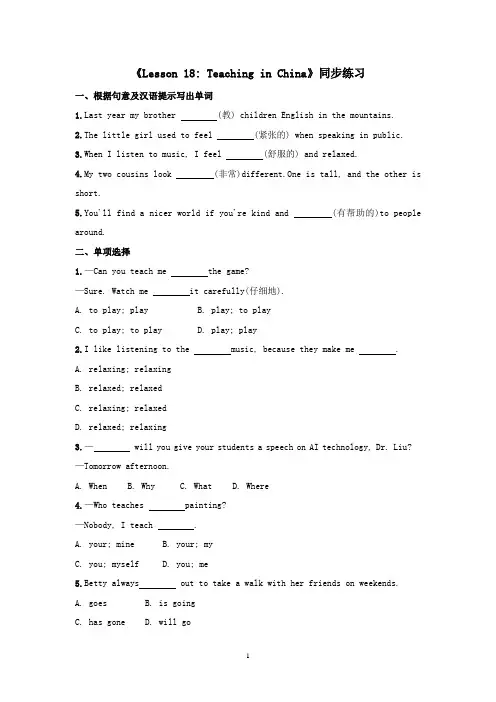
《Lesson 18: Teaching in China》同步练习一、根据句意及汉语提示写出单词st year my brother (教) children English in the mountains.2.The little girl used to feel (紧张的) when speaking in public.3.When I listen to music, I feel (舒服的) and relaxed.4.My two cousins look (非常)different.One is tall, and the other is short.5.You'll find a nicer world if you're kind and (有帮助的)to people around.二、单项选择1.—Can you teach me the game?—Sure. Watch me it carefully(仔细地).A. to play; playB. play; to playC. to play; to playD. play; play2.I like listening to the music, because they make me .A. relaxing; relaxingB. relaxed; relaxedC. relaxing; relaxedD. relaxed; relaxing3.— will you give your students a speech on AI technology, Dr. Liu? —Tomorrow afternoon.A. WhenB. WhyC. WhatD. Where4.—Who teaches painting?—Nobody, I teach .A. your; mineB. your; myC. you; myselfD. you; me5.Betty always out to take a walk with her friends on weekends.A. goesB. is goingC. has goneD. will go三、连词成句1.writing, he, his, is, an e-mail, to, family?2. had, last weekend, he, a, wonderful, school trip.3.I'm, to, happy, be, so, your, friend.4.learn, friendly, others, to, be, to.5.often, from, they, one, to, move, another, city.四、从方框中选择最佳选项补全对话(有两项多余)(Peter is an exchange student in your school. Now you are talking about his life in Henan.)A: Hello, Peter!1.B: Great! I enjoy everything here!And I'm going back next Wednesday.A:2.B: Yes, I went to Shaolin Temple, Mount Song and so on. They are really great. A: Do you like the food here?B: Yeah. 3. I like Henan stewed noodles(烩面)best.A: What do you think of the people here?B:4. They are always ready to give me a hand when I'm in trouble. A: I'm happy to know you have a good time here.It's Saturday tomorrow. We can go to Henan Museum together.B: That sounds fun. 5.A: We can ride a bike. It's not far from our school.B: OK.五、阅读理解What do you think of your school life? Someone says it is very boring because they just have lessons all day. But let me tell you how you can make your school life full of fun.I am in school now but believe me, I enjoy my school days a lot.There are lots of ways to help you stay happy at school.First, you should make a lot of friends. You can share joy and sadness, enjoy your school days and do everything together with them.Second, you'd better be in one of your school sports clubs. You can take part in different sports or matches. It doesn't matter who wins because playing itself is fun. Sports will make your school life colourful. Third, you should do well in study. Your marks will be an important factor. With good marks, you will find it easier to be happy.I am sure if you do the above three things, you'll enjoy yourself very much at school. You'll love to go to school and maybe want to go to school even at the weekend.1.The writer his/her school life.A. doesn't likeB. enjoysC. feels bored withD. is tired of2.You should make some friends at school,because .A. friends can help you with your homeworkB. you can't have your classes on your ownC. your parents ask you to do soD. you can share your feelings and do other things with them3.Sports can be an important part of your school life if you .A. are in every sports clubB. take part in all kinds of matchesC. play sports for funD. win all matches4.It is to be good at school study.A. importantB. interestingC. easyD. hard5.The best title for this passage is .A. School ClubsB. How to Enjoy Your School LifeC. How to Get Good MarksD. How to Make Friends at School参考答案一、根据句意及汉语提示写出单词1.taught句意:去年我哥哥在山里教孩子们英语。
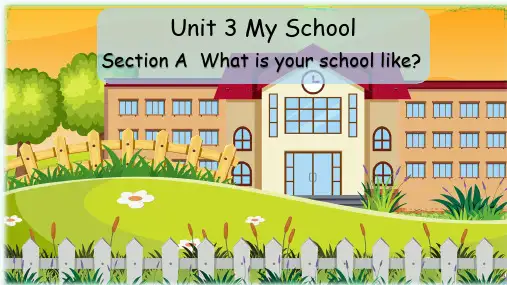
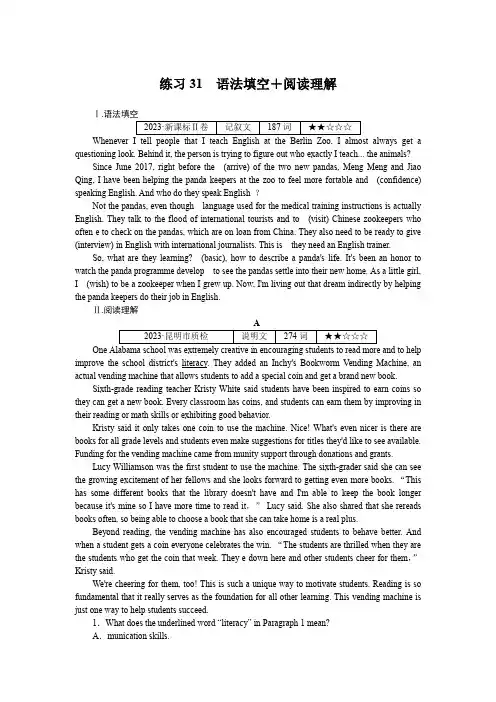
练习31语法填空+阅读理解Ⅰ.语法填空Whenever always get a questioning look. Behind it, the person is trying to figure out who exactly I teach... the animals?Since June 2017, right before the (arrive) of the two new pandas, Meng Meng and Jiao Qing, I have been helping the panda keepers at the zoo to feel more fortable and (confidence) speaking English. And who do they speak English ?Not the pandas, even though language used for the medical training instructions is actually English. They talk to the flood of international tourists and to (visit) Chinese zookeepers who often e to check on the pandas, which are on loan from China. They also need to be ready to give (interview) in English with international journalists. This is they need an English trainer.So, what are they learning? (basic), how to describe a panda's life. It's been an honor to watch the panda programme develop to see the pandas settle into their new home. As a little girl, I (wish) to be a zookeeper when I grew up. Now, I'm living out that dream indirectly by helping the panda keepers do their job in English.Ⅱ.阅读理解improve the school district's literacy. They added an Inchy's Bookworm Vending Machine, an actual vending machine that allows students to add a special coin and get a brand new book.Sixthgrade reading teacher Kristy White said students have been inspired to earn coins so they can get a new book. Every classroom has coins, and students can earn them by improving in their reading or math skills or exhibiting good behavior.Kristy said it only takes one coin to use the machine. Nice! What's even nicer is there are books for all grade levels and students even make suggestions for titles they'd like to see available. Funding for the vending machine came from munity support through donations and grants.Lucy Williamson was the first student to use the machine. The sixthgrader said she can see the growing excitement of her fellows and she looks forward to getting even more books. “This has some different books that the library doesn't have and I'm able to keep the book longer because it's mine so I have more time to read it,” Lucy said. She also shared that she rereads books often, so being able to choose a book that she can take home is a real plus.Beyond reading, the vending machine has also encouraged students to behave better. And when a student gets a coin everyone celebrates the win. “The students are thrilled when they are the students who get the coin that week. They e down here and other students cheer for them,”Kristy said.We're cheering for them, too! This is such a unique way to motivate students. Reading is so fundamental that it really serves as the foundation for all other learning. This vending machine is just one way to help students succeed.1.What does the underlined word “literacy” in Paragraph 1 mean?A.munication skills.B.Academic performance.C.Professional knowledge.D.Reading and writing ability.2.What can we know about the vending machine?A.It charges students for the special coins.B.It encourages students' positive growth.C.It turns a blind eye to students' proposals.D.It aims to raise money for local munity.3.Why did Lucy mit herself to using the vending machine?A.To enrich her extracurricular life.B.To escape from the school library.C.To enjoy selecting and rereading books.D.To gain respect and praise from her fellows.4.Which is the suitable title for the text?A.Kristy White: A Creative Reading TeacherB.Lucy Williamson: A Model Pupil at SchoolC.A Unique Way to Inspire Students to ReadD.The Importance of Offering Reading Courses“I saw it first,”Amy said, as she ripped the old leather wallet out of Charlie's hands. Without saying a word, as if they both understood that this was a secret they didn't want to share with anyone, they slipped into the alley, where no one could see them look inside.“There's got to be a million dollars here!” Charlie blurted out, when they saw the pile of hundreddollar bills. Amy, the more realistic of the two, did a quick estimate, thumbing through the wad of cash. “More like thousands,” she said, her voice shaking in disbelief.They'd found the wallet in a flowerbed by the sidewalk, when Charlie dropped his cell phone while he was trying to talk and eat a slice of pepperoni pizza at the same time. Amy stuffed the wallet into her backpack and pulled Charlie along by his elbow toward her house. As they rushed toward Viceroy Avenue, they talked excitedly about what they could do with the moneybuy gifts for parents and friends, get new clothes, travel to the rainforest in Costa Rica, and adopt a whale. It looked like all of their dreams would e true. For the last block, however, they didn't talk. Each began to suspect that the other one was silently adding to the list of things they could buy.They finally reached Amy's house, but instead of going inside, they walked around the house to the back porch. They opened the wallet and counted the money into piles of ten. The total was $2400more money than either of them had ever seen. Then they both started talking at once. Who lost it? Their moods shifted, sinking from the high of being rich for fifteen minutes to resigning themselves to what they must do next. In the wallet's clear plastic partment, there was a driver's license. They knew what they had to do. Although they would lose their newlyfound treasure, in a way, they felt relieved.5.Where did Amy and Charlie find the wallet?A.In an alley.B.In a backpack.C.On the sidewalk.D.Among some flowers.6.In Paragraph 2, why was Amy's voice shaking?A.She was afraid that they would be seen by others.B.She was disappointed there wasn't a million dollars.C.She was fearful that Charlie would tell someone else.D.She felt nervous because she'd never seen so much money. 7.How did the children's mood changed on their way to Amy's house? A.From happy to angry.B.From relieved to worried.C.From excited to skeptical.D.From nervous to disappointed.8.What did the children decide to do at the end of the story?A.To keep the money a secret from others.B.To return the wallet to its rightful owner.C.To put the wallet back where they found it.D.To buy many different things with the money.黄金考点。
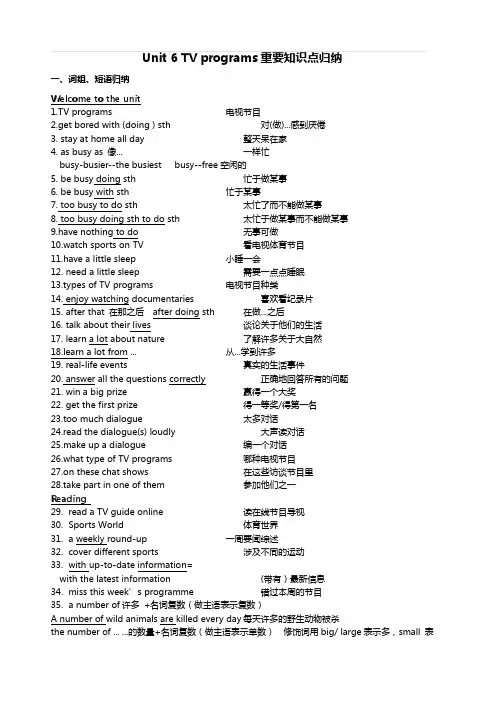
Unit 6 TV programs重要知识点归纳一、词组、短语归纳Welcome to the unit programs 电视节目2.get bored with (doing ) sth 对(做)...感到厌倦3. stay at home all day 整天呆在家4. as busy as 像... 一样忙busy-busier--the busiest busy--free空闲的5. be busy doing sth 忙于做某事6. be busy with sth 忙于某事7. too busy to do sth 太忙了而不能做某事8. too busy doing sth to do sth 太忙于做某事而不能做某事9.have nothing to do 无事可做10.watch sports on TV 看电视体育节目11.have a little sleep 小睡一会12. need a little sleep 需要一点点睡眠13.types of TV programs 电视节目种类14. enjoy watching documentaries 喜欢看纪录片15. after that 在那之后after doing sth 在做...之后16. talk about their lives 谈论关于他们的生活17. learn a lot about nature 了解许多关于大自然18.learn a lot from ... 从...学到许多19. real-life events 真实的生活事件20. answer all the questions correctly 正确地回答所有的问题21. win a big prize 赢得一个大奖22. get the first prize 得一等奖/得第一名23.too much dialogue 太多对话24.read the dialogue(s) loudly 大声读对话25.make up a dialogue 编一个对话26.what type of TV programs 哪种电视节目27.on these chat shows 在这些访谈节目里28.take part in one of them 参加他们之一Reading29.read a TV guide online 读在线节目导视30.Sports World 体育世界31.a weekly round-up 一周要闻综述32.cover different sports 涉及不同的运动33.with up-to-date information=with the latest information (带有)最新信息34.miss this week’s programme 错过本周的节目35.a number of许多+名词复数(做主语表示复数)A number of wild animals are killed every day 每天许多的野生动物被杀the number of ... ...的数量+名词复数(做主语表示单数)修饰词用big/ large表示多,small 表示少The number of students is becoming smaller and smaller. 学生的数量正变得越来越少36.interviews with famous players 对著名运动员的采访have an interview with sb--interview sb 采访某人37.a report on 一个关于...的报告38.will be included 将被包括include sth.包括某事在内include前面要有主语The university includes tencolleges. 该大学有10个学院including用在逗号后面,39.The band played many songs, including some of my favourites. 这个乐队唱了很多的歌,包括我喜欢的一些歌40.football fan 一个足球迷41.this year's Beijing Music Awards 今年的北京音乐颁奖晚会42.cover live现场直播be covered live 被现场直播be covered with sth 被...覆盖43.The ground is covered with leaves in autumn.44.many Asian pop stars 许多亚洲流行明星45.this coming Saturday 即将来临的这个星期六46.attend the meeting/a wedding 参加会议/婚礼47.vote online for…在线为….投票48.announce the results 宣布结果49.The results will be announced in two hours. 结果将在两个小时后宣布50.send text messages to 1396 发送文本信息到139651.send ...to ...发送...到... send for sb. 派人去请send away 开除,解雇,赶走send up 发射52.while watching the show 当观看表演时53.write down your answers 写下你的答案54.win two free concert tickets 赢得两张免费音乐会票55.murder in a country house 在乡村小屋的谋杀56.a horror film directed by 一部由…导演的恐怖片57.direct a film 导演一部电影a film directed by a famous director 一部由一个著名导演导演的电影a wealthy doctor--a rich doctor 一个富有的医生58.wealth 财富health健康healthy healthily59.be found dead /dying 被发现死了/ 要死了died死了---has been dead 已经死了60.find out the answer 弄清楚/找出答案61.be full of horror and mysteries 充满恐怖和神密be full of = be filled with 充满62.enjoy solving mysteries 喜欢解谜;揭开谜底63.get scared easily 容易受惊吓64.the end of the film 电影的结尾65.a one-hour documentary 一个一小时的记录片66.take a close look at…近距离地看一看67.the life of tigers in India 在印度老虎的生活68.face danger 面临危险face to face 面对面69.how much danger 多少危险70.unless humans stop hunting them 除非人类停止猎杀它们71.hunt them for their fur and bones 猎取他们毛和骨72.feel sad about it 对此感到悲伤73.see scenes from India 看见来自印度的风光74.one of the few places 较少的地方之一75.win an award for 因…而获奖76.say sth in a low voice 用低声说某事77.send out later稍后发出14.cry for help 尖叫求助78.Jack doesn’t mind feeling scared 杰克不介意感到恐惧Grammarplete ...quickly 快速完成....80.introduce ...to... 向。
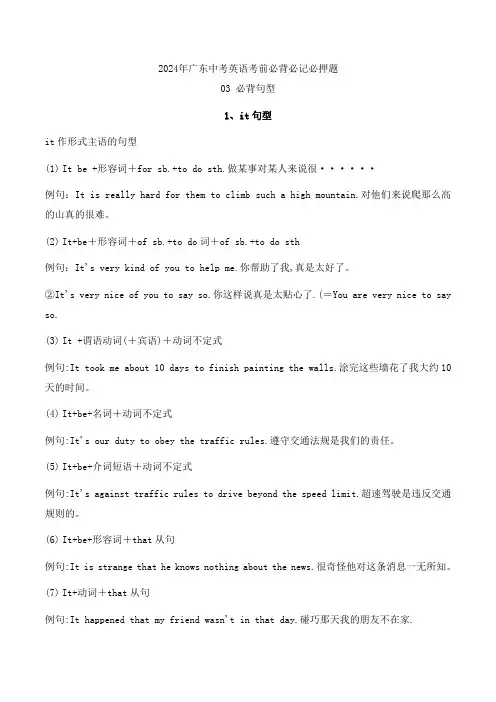
2024年广东中考英语考前必背必记必押题03 必背句型1、it句型it作形式主语的句型(1)It be +形容词+for sb.+to do sth.做某事对某人来说很······例句:It is really hard for them to climb such a high mountain.对他们来说爬那么高的山真的很难。
(2)It+be+形容词+of sb.+to do词+of sb.+to do sth例句:It's very kind of you to help me.你帮助了我,真是太好了。
②It's very nice of you to say so.你这样说真是太贴心了.(=You are very nice to say so.(3)It +谓语动词(+宾语)+动词不定式例句:It took me about 10 days to finish painting the walls.涂完这些墙花了我大约10天的时间。
(4)It+be+名词+动词不定式例句:It's our duty to obey the traffic rules.遵守交通法规是我们的责任。
(5)It+be+介词短语+动词不定式例句:It's against traffic rules to drive beyond the speed limit.超速驾驶是违反交通规则的。
(6)It+be+形容词+that从句例句:It is strange that he knows nothing about the news.很奇怪他对这条消息一无所知。
(7)It+动词+that从句例句:It happened that my friend wasn't in that day.碰巧那天我的朋友不在家.(8)It +be+过去分词+that 从句例句 :It was reported that China has built nearly 700,000 5G base stations.据报道中国已经建立了近70万5G基站。
第一篇:英语短篇小说鉴赏PPTAbout the authorStory presentation"Miss Brill," Katherine Mansfield's short story about a woman's Sunday outing to a park, was published in her 1922 collection of stories entitled The Garden Party. The story's enduring popularity is due in part to its use of a stream-of-consciousness narrative in which Miss Brill's character is revealed through her thoughts about others as she watches a crowd from a park bench. Mansfield's talent as a writer is illustrated by the fact that she at no point tells what Miss Brill is thinking about her own life, yet the story draws one of the most succinct, complete character portraits in twentieth-century short fiction. "Miss Brill" has become one of Mansfield's most popular stories, and has been reprinted in numerous anthologies and collections. The story is typical of Mansfield's style; she often employed stream-of-consciousness narration in order to show the psychological complexity of everyday experience in her characters' lives.About stream-of-consciousnessPlot summaryThe story is about Miss Brill, a middle-aged English teacher in an unnamed French vacation town. It follows her on a regular Sunday afternoon in the park, which she spends walking and sitting in the park, wearing an old but beloved fur. She sees the world as if it was a stage, and enjoys watching the people around her, often judging them condescendingly(谦逊的). However, she then overhears a young couple's cruel remark about herself, and the story ends with her realizing that she is not really needed in the busy world, and she thinks that she heard the fur crying. Mansfield's personification(化身)throughout the passage reveals a sense of loneliness belonging to Miss Brill for she not only fabricates(构成)a connection with the other park passers-by, but also personifies(使人格化)her inanimate(死气沉沉的)piece of clothing by conversing(谈话)with it as well as feeling for it.CharactersMiss Brill, an English professorMany other passers-by, includingYoung coupleMajor motifslonelinessillusion versus(对(指诉讼、比赛等中),与…相对)realityrejectionisolation(隔绝,孤立,隔离,绝缘,离析)ThemeWhat this story is trying to illustrate is that sometimes people can be happy through living in an illusion. However, this kind of happiness is fragile and can be easily destroyed. Unfortunately, modern society does not provide a place for everyone. Inevitably, there are those people, often elderly, who become marginalized; they live alone, friendless and mostly ignored. Miss Brill is one of these people, which becomes clear in her lack of communication with the people around her in the park. “They did not speak.Literary significanceThe text is written in the modernist mode, third-person limited point of view, without a set structureMy understandingsThe author is very perceptive(有理解的). She describes the protagonist’s inner mind in detail. Miss Brill is an old, lonely woman (for she always goes to a place where there are a lot of old men and women). She is single all through her years. She has no child, no husband, and no relatives. So she has nobody to talk to when she feels lonely. She is left alone. However, she serves in a community, whose aim is to help the poor people in need. Sometimes she teaches pupils English, sometimes reads the newspaper to the old invalid gentleman. After finishing her work in the community, she goes back home alone. No one shares her joys and sorrows of life. So she always talks to her “little thing”, fur.第二篇:英语说课PPT大学英语说课讲稿课件ppt一、introduction(导言)英语说课是英语教学中的重要一环,也是衡量一位英语教师对教材的把握、分析及教师本人对上课进程的宏观控制能力的有力手段,能从理论上指导教师贯彻教学大纲,真正做到教与学相结合,将教材、大纲、教师、学生、课堂融为有机整体,对不断提高教师教学能力和教研能力,有着突出的作用。
Unit3WhyITeachPeterG.Beidler Everyteacherprobablyaskshimselftimeandagain:Whatarethereasonsforchoo singteachingasacareer?Dotherewardsteachingoutweighthetryingcomments? Answeringthesequestionsisnotasimpletask.Let'sseewhattheauthorsays.Whydoyouteach?MyfriendaskedthequestionwhenItoldhimthatIdidn'twan ttobeconsideredforanadministrativeposition.HewaspuzzledthatIdidnotwantw hatwasobviouslya"stepup"towardwhatallAmericansaretaughttowantwhenthey growup:moneyandpower.CertainlyIdon'tteachbecauseteachingiseasyforme.Teachingisthemostdiffic ultofthevariouswaysIhaveattemptedtoearnmyliving:mechanic,carpenter,write r.Forme,teachingisared-eye,sweaty-palm,sinking-stomachprofession.Red-eye, becauseIneverfeelreadytoteachnomatterhowlateIstayuppreparing.Sweaty-pal m,becauseI'malwaysnervousbeforeIentertheclassroom,surethatIwillbefoundo utforthefoolthatIam.Sinking-stomach,becauseIleavetheclassroomanhourlaterc onvincedthatIwasevenmoreboringthanusual.NordoIteachbecauseIthinkIknowanswers,orbecauseIhaveknowledgeIfeelc ompelledtoshare.SometimesIamamazedthatmystudentsactuallytakenotesonw hatIsayinclass!Why,then,doIteach?IteachbecauseIlikethepaceoftheacademiccalendar.June,July,andAugustof feranopportunityforreflection,researchandwriting.Iteachbecauseteachingisaprofessionbuiltonchange.Whenthematerialisthe same,Ichange——and,moreimportant,mystudentschange.IteachbecauseIlikethefreedomtomakemyownmistakes,tolearnmyownless ons,tostimulatemyselfandmystudents.Asateacher,I'mmyownboss.IfIwantmyfr eshmentolearntowritebycreatingtheirownteGtbook,whoistosayIcan't?Suchcou rsesmaybehugefailures,butwecanalllearnfromfailures.IteachbecauseIliketoaskquestionsthatstudentsmuststruggletoanswer.The worldisfullofrightanswerstobadquestions.Whileteaching,Isometimesfindgood questions.IteachbecauseIenjoyfindingwaysofgettingmyselfandmystudentsoutoftheiv orytowerandintotherealworld.Ioncetaughtacoursecalled"Self-RelianceinaTech nologicalSociety."My15studentsreadEmerson,Thoreau,andHuGley.Theykeptdi aries.Theywrotetermpapers.Butwealsosetupacorporation,borrowedmoney,purchasedarun-downhouse andpracticedself-reliancebyrenovatingit.Attheendofthesemester,wewouldtheh ouse,repaidourloan,paidortaGes,anddistributedtheprofitsamongthegroup.Soteachinggivesmepace,andvariety,andchallenge,andtheopportunitytokee ponlearning.Ihaveleftout,however,themostimportantreasonswhyIteach.OneisVicky.Myfirstdoctoralstudent,Vickywasanenergeticstudentwholabor edatherdissertationonalittle-known14thcenturypoet.Shewrotearticlesandsentt hemofftolearnedjournals.Shediditallherself,withanoccasionalnudgefromme.B utIwastherewhenshefinishedherdissertation,learnedthatherarticleswereaccept ed,gotajobandwonafellowshiptoHarvardworkingonabookdevelopingideasshe' dfirsthadasmystudent.AnotherreasonisGeorge,whostartedasanengineeringstudent,thenswitched toEnglishbecausehedecidedhelikedpeoplebetterthanthings.ThereisJeanne,wholeftcollege,butwasbroughtbackbyherclassmatesbecaus etheywantedhertoseetheendoftheself-reliancehouseproject.Iwasherewhenshec ameback.Iwastherewhenshetoldmethatshelaterbecameinterestedintheurbanp oorandwentontobecomeacivilrightslawyer.ThereisJacqui,acleaningwomanwhoknowsmorebyintuitionthanmostofusl earnbyanalysis.Jacquihasdecidedtofinishhighschoolandgotocollege.ThesearetherealreasonsIteach,thesepeoplewhogrowandchangeinfrontofm e.Beingateacherisbeingpresentatthecreation,whentheclaybeginstobreathe.A"promotion"outofteachingwouldgivememoneyandpower.ButIhavemone y.IgetpaidtodowhatIenjoy:reading,talkingwithpeople,andaskingquestionlike," Whatisthepointofbeingrich?"AndIhavepower.Ihavethepowertonudge,tofansparks,tosuggestbooks,topoi ntoutapathway.Whatotherpowermatters?Butteachingofferssomethingbesidesmoneyandpower:itofferslove.Notonlyt heloveoflearningandofbooksandideas,butalsothelovethatateacherfeelsforthatr arestudentwhowalksintoateacher'slifeandbeginstobreathe.Perhapsloveisthewr ongword:magicmightbebetter.Iteachbecause,beingaroundpeoplewhoarebeginningtobreathe,Ioccasionall yfindmyselfcatchingmybreathwiththem.我为何教书你为什么教书呢?当我告诉我的朋友我不想做任何行政职务时,他向我提出了这个问题。
1.help sb (to) do帮助某人做某事help with sth在某方面帮助She often helps me with my English / (to) learn English.2.teach sb to do sth 教某人做某事teach oneself = learn...by oneself 自学I taught myself French.= I learned French by myself.3.learn to do 学习去做某事4.lead sb to do sth 引导某人做某事What led you to think so?5.guide sb to do sth 指导某人去做某事He can guide you to find the way.Mr. Brown guide me to do a lot better in science.6.volunteer to do sth 自愿做某事7.(can’t) afford to do sth 买得起、能承受/负担得起做某事We can’t afford to wait any longer.8.attempt to do尝试做某事9.agree to do sth 同意去做某事agree with sb 同意某人的观点10.decide/make a decision to do sth 决定去做某事11.prepare to do sth准备去做某事prepare for sth为…做准备I have to prepare for the exam.12.have to do sth 必须/不得不做某事13.manage to do 设法做成某事14.promise to do 承诺做某事15.fail to do sth 未能做某事16.allow sb to do sth 允许某人做某事被动be allowed to do sth17.encourage sb to do sth 鼓励某人做某事My father encourages me to study hard.18.persuade sb (not) to do sth = persuade sb into/out of doing sth说服/劝说某人做某事19.prefer sb to do sth宁愿/更希望某人做某事We prefer you to attend the wedding.我们更希望你参加这个婚礼。
人教部编版七年级下册英语教案Unit 11 Section B (2a-3c) 导学安Period 4Section B (2a-3c)1.Then the guide taught us how to make a model robot.然后,导游教我们如何制作机器人模型。
(课本第65页)(1)teach作动词,意为“教;讲授”。
常用短语:teach sb.to do sth.意为“教某人做某事”。
(2)how to make a model robot为“疑问词+动词不定式”结构。
在此结构中,疑问词包括疑问代词what, which, who, whose和疑问副词when, where, how, why等。
这些疑问词和动词不定式一起构成了动词不定式短语,在句子中可作主语、宾语、表语等。
2.After that, I went to the gift shop and bought some lovely gifts for my parents.之后,我去了礼品店并为父母买了一些可爱的礼物。
(课本第65页)(1)buy的过去式是bought,在此句中接双宾语,buy sth.for sb.=buy sb.sth.。
(2)loveyly意为“可爱的”,虽然以-ly结尾,但它的词性是形容词,需要特别注意。
类似的词有:friendly(友好的),likely(可能的)等。
3.All in all, it was an exciting day.总之,这是令人兴奋的一天。
(课本第65页)all in all意为“总而言之”,类似的短语有:after all(终究;到底;毕竟),above all(最重要的是;尤其是)。
4.Everything was about robots and I'm not interested in that.一切都是有关机器人的,我对那方面不感兴趣。
(课本第65页)be interested in后加名词或代词,还可以加动词-ing形式,意为“对……感兴趣”。
Unit 7 知识归纳一、词汇变形1. safe (adj.) 安全的→safety (n.) 安全性2. bad (adj.) 坏的→badly (adv.) 坏地→worse 更坏的→worst 最坏的3. educate (v.) 教育→education (n.) 教育→educational (adj.) 有教育意义的4. social (adj.) 社会的→society (n.) 社会5. choose (v.) 选择→choice (n.) 选择6. excite (v.) 使兴奋→exciting (adj.) 使人兴奋的↘excited (adj.) 兴奋的8. agree (v.) 同意→agreement (n.) 意见一致↘disagree (v.) 不同意→disagreement (n.) 分歧9. succeed (v.) 成功→success (n.) 成功→successful (adj.) 成功的10. difficult (adj.) 困难的→difficulty (n.) 困难二、短语归纳1. allow doing sth. 允许做某事allow sb. to do sth. 允许某人做某事be allowed to do sth. 被允许做某事should be allowed to do sth. 应该被允许做某事shouldn’t be allowed to do sth. 不应该允许做某事2. driver’s license 驾照3. get sth. done / have sth. done 使某事被做get ears pierced 穿耳洞4. sixteen-year-olds 16岁的青少年5. have part-time job 有兼职工作6. stop doing sth. 停止正在做的事stop to do sth. 停下来去做某事stop …from… = keep …from…阻止做某事7. It seems that + 从句好像……seem to do sth. 好像做某事8. 四个“穿”put on 穿上(强调穿的动作)wear 穿着(强调穿的状态)be in + 颜色穿什么颜色的衣服dress sb. 为某人穿衣dress up 盛装打扮9. need to do sth. 需要做某事10. be excited about doing sth. 对做某事感到兴奋11. take photos 拍照12. by one’s side 在某人身边13. make sure 确保14. keep…from…使……避开……15. give sb. a hug 给某人一个拥抱16. talk back 回嘴talk to sb. = talk with sb. 和某人说话talk about sth. / sb. 谈论某事/ 某人17. awful dream 噩梦18. by + 时间在……之前by doing sth. 通过做某事by + 交通工具乘骑…by + 地点在……旁边by + 动作执行者被某人by 的短语:go by 过去;流逝come by 路过;偶然遇到;pass by 经过;走过;drop by 顺便拜访;by mistake 错误的by accident = by chance 偶然的by the way 顺便一提by the time 在……之前by the end of …在……之前by oneself 独自的;单独19. think back 回想think of 想起;认为think about 想起;考虑20. be late for 迟到21. regret doing sth. 后悔做过某事22. learn…from…向……学习learn to do sth. 学习做某事learn by oneself = teach oneself 自学23. take care of = look after 照顾take care 当心,小心take after 与……相像24. 区别instead 和instead ofinstead 代替(用于句末)instead of + n. / 代词/ v-ing (用于句中)25. move out 搬出去move to + 地点搬到某地26. continue to do sth. / continue doing sth. 继续做某事27. be strict with sb. 对某人要求严格be strict in sth. 在某方面要求严格28. get in the way of …挡……的路;妨碍in the way 挡路;妨碍in this way 这样in a way 某个方面;从某种意义上by this way 顺便说一下on the way 在路上a way to do sth. = a way of doing sth. 做某事的方法29. as …as possible = as… as sb. can/ could 尽可能的……30. against doing sth. 反对做某事/ for doing sth. 赞成做某事31. end up doing sth. = finish doing sth. 结束做某事32. be serious about…认真对待……33. care about 关心34. make one’s own decision 自己做决定35. achieve one’s dream 实现某人的梦想36. make a choice 做选择37. keep off 关闭38. in the end = at last = finally 最后39. have a chance to do sth. 有一个机会做某事40. encourage sb. to do sth. 鼓励某人做某事41. I think / believe / suppose / expect + 宾语从句变否定句时,要在主句上否定,即“否定转移”。